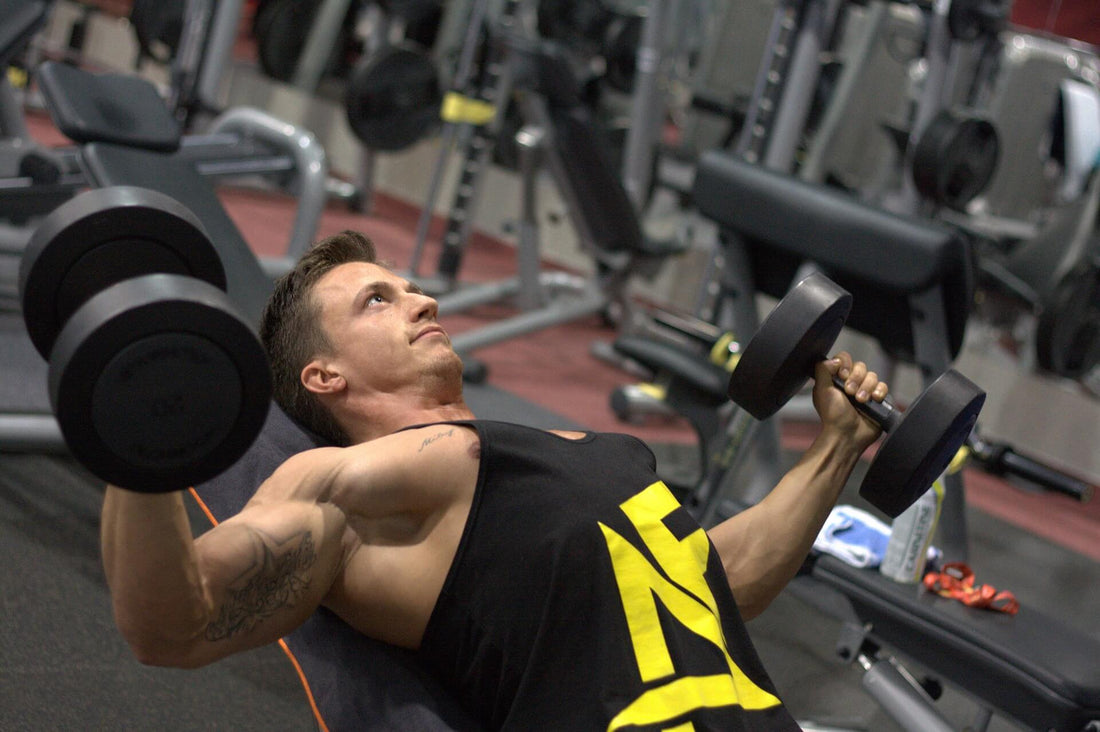Overview
The bench press is a staple in any upper body workout program. With its different variations including the incline bench press and the decline bench press, it is an ideal exercise for building strength, size and endurance of your chest, triceps, and delts.
The bench press can be performed on an Olympic weight bench with either barbells or dumbbells.
When I say dumbbell bench press, you may think of the great 8x Mr. Olympia Ronnie Coleman working two dumbbells that are so loaded that they are almost as long as his entire arm while yelling:” Light weight, baby!” So, a legit exercise for the ultimate elite bodybuilder for sure. But should you incorporate it into your own program? Isn’t the barbell bench press the golden standard?
Let’s first take a look at what unique benefits the dumbbell bench press offers.
The Benefits of the Dumbbell Bench Press
First, let’s answer the question “what muscles does the dumbbell bench press work?” The answer is “the chest including the upper chest (incline dumbbell press) and the lower chest (decline dumbbell press), the triceps and the anterior deltoid (front delt)”. This applies to both the barbell bench press and the dumbbell bench press. Then what are the unique benefits using dumbbells?
1. It activates even more muscles.
Unlike in a barbell bench press where the weight is evenly distributed to both arms, in a dumbbell bench press, each arm works independently. This poses more challenges to the rotator cuff muscles (the muscles that keep your arms in the shoulder sockets) and the muscles of the core in order to stabilize and balance the weights.
The benefits of working these muscles out include:
A. Improved shoulder stability and function. You can perform better at throwing, lifting, reach, performing overhead activities, etc.
B. Improved posture and alignment
C. Preventing injury
2. The range of motion is greater and freer, thus better stimulating the muscles.
With dumbbells, you can actually lower them further down towards the chest in comparison with barbells. This allows for a deeper stretch of the muscles and stimulates them to a greater extent. Besides, you are free to customize the exercise to better target specific different groups of muscles. For instance, you can apply the neutral grip (palms facing each other by rotating the dumbbells inward) or perform the squeeze press, something not possible with a barbell.
Grab dumbbells and an adjustable weight bench to start building your upper body right away.
3. It’s safer, especially when you are training solo.
We probably have all watched one or two gym fail compilation videos where some poor person overestimates their strength and gets pinned under a barbell when doing the bench press. We never want that to happen! In a dumbbell bench press session, if the weights are too heavy for you to perform one more rep, simply let go. The risk of you being pinned under the weights is significantly lower.
Note that the catch on the Flybird Olympic weight bench is adjustable so that even when you are doing barbell bench press on it, you are still very safe.
The Limitations of the Dumbbell Bench Press
Naturally there are limitations to this exercise, too. They include:
1. Weight limitations
Typically, you can load less weight doing the dumbbell bench press than the barbell bench press. This is due to several factors:
A. You have to pick up the dumbbells whereas the barbell is already up there. Therefore, your grip power sets a limitation on how much weight you can load.
B. As each arm works independently to carry the weight, more effort is required to stabilize and balance the dumbbells, therefore limiting the load.
C. Larger and freer range of motion means it takes more effort to perform a bench press with dumbbells than with a barbell with the same weight, which effectively means that you can load more weights with a barbell.
2. Steeper learning curve (the greater the freedom, the greater the responsibility)
A. Harder to coordinate the 2 arms
B. Harder to stabilize the weight
C. Harder to perform consistently

